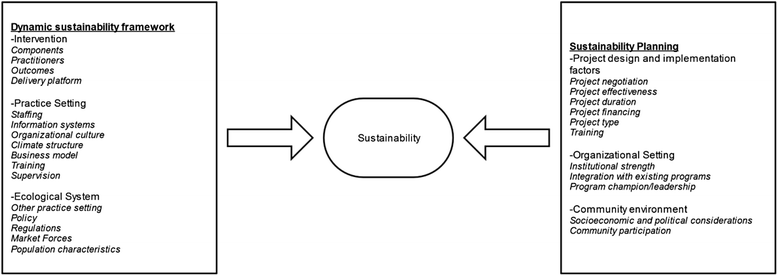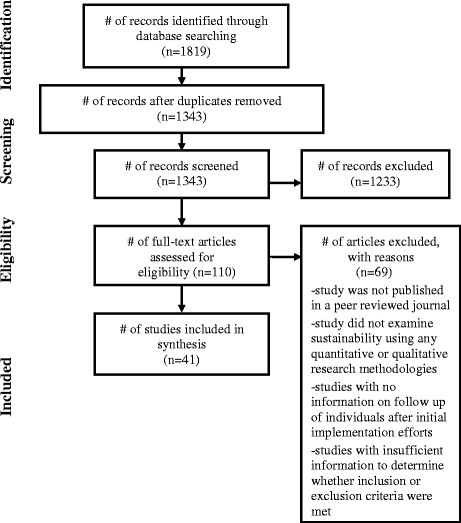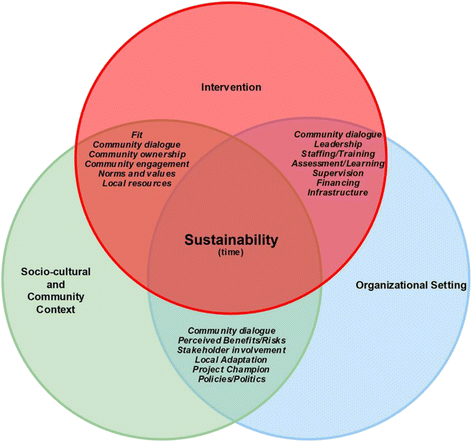Toward the sustainability of health interventions implemented in sub-Saharan Africa: a systematic review and conceptual framework
- PMID: 27005280
- PMCID: PMC4804528
- DOI: 10.1186/s13012-016-0392-8
Toward the sustainability of health interventions implemented in sub-Saharan Africa: a systematic review and conceptual framework
Erratum in
-
Erratum to: 'Toward the sustainability of health interventions implemented in sub-Saharan Africa: a systematic review and conceptual framework'.Implement Sci. 2016 Apr 18;11:53. doi: 10.1186/s13012-016-0415-5. Implement Sci. 2016. PMID: 27089925 Free PMC article. No abstract available.
Abstract
Background: Sub-Saharan Africa (SSA) is facing a double burden of disease with a rising prevalence of non-communicable diseases (NCDs) while the burden of communicable diseases (CDs) remains high. Despite these challenges, there remains a significant need to understand how or under what conditions health interventions implemented in sub-Saharan Africa are sustained. The purpose of this study was to conduct a systematic review of empirical literature to explore how health interventions implemented in SSA are sustained.
Methods: We searched MEDLINE, Biological Abstracts, CINAHL, Embase, PsycInfo, SCIELO, Web of Science, and Google Scholar for available research investigating the sustainability of health interventions implemented in sub-Saharan Africa. We also used narrative synthesis to examine factors whether positive or negative that may influence the sustainability of health interventions in the region.
Results: The search identified 1819 citations, and following removal of duplicates and our inclusion/exclusion criteria, only 41 papers were eligible for inclusion in the review. Twenty-six countries were represented in this review, with Kenya and Nigeria having the most representation of available studies examining sustainability. Study dates ranged from 1996 to 2015. Of note, majority of these studies (30 %) were published in 2014. The most common framework utilized was the sustainability framework, which was discussed in four of the studies. Nineteen out of 41 studies (46 %) reported sustainability outcomes focused on communicable diseases, with HIV and AIDS represented in majority of the studies, followed by malaria. Only 21 out of 41 studies had clear definitions of sustainability. Community ownership and mobilization were recognized by many of the reviewed studies as crucial facilitators for intervention sustainability, both early on and after intervention implementation, while social and ecological conditions as well as societal upheavals were barriers that influenced the sustainment of interventions in sub-Saharan Africa.
Conclusion: The sustainability of health interventions implemented in sub-Saharan Africa is inevitable given the double burden of diseases, health care worker shortage, weak health systems, and limited resources. We propose a conceptual framework that draws attention to sustainability as a core component of the overall life cycle of interventions implemented in the region.
Keywords: Health interventions; Implementations; Sub-Saharan Africa; Sustainability.
Figures
Similar articles
-
Education support services for improving school engagement and academic performance of children and adolescents with a chronic health condition.Cochrane Database Syst Rev. 2023 Feb 8;2(2):CD011538. doi: 10.1002/14651858.CD011538.pub2. Cochrane Database Syst Rev. 2023. PMID: 36752365 Free PMC article.
-
Measures implemented in the school setting to contain the COVID-19 pandemic.Cochrane Database Syst Rev. 2022 Jan 17;1(1):CD015029. doi: 10.1002/14651858.CD015029. Cochrane Database Syst Rev. 2022. Update in: Cochrane Database Syst Rev. 2024 May 2;5:CD015029. doi: 10.1002/14651858.CD015029.pub2. PMID: 35037252 Free PMC article. Updated.
-
How lived experiences of illness trajectories, burdens of treatment, and social inequalities shape service user and caregiver participation in health and social care: a theory-informed qualitative evidence synthesis.Health Soc Care Deliv Res. 2025 Jun;13(24):1-120. doi: 10.3310/HGTQ8159. Health Soc Care Deliv Res. 2025. PMID: 40548558
-
Factors that impact on the use of mechanical ventilation weaning protocols in critically ill adults and children: a qualitative evidence-synthesis.Cochrane Database Syst Rev. 2016 Oct 4;10(10):CD011812. doi: 10.1002/14651858.CD011812.pub2. Cochrane Database Syst Rev. 2016. PMID: 27699783 Free PMC article.
-
Survivor, family and professional experiences of psychosocial interventions for sexual abuse and violence: a qualitative evidence synthesis.Cochrane Database Syst Rev. 2022 Oct 4;10(10):CD013648. doi: 10.1002/14651858.CD013648.pub2. Cochrane Database Syst Rev. 2022. PMID: 36194890 Free PMC article.
Cited by
-
Optimising scale-up for public health impact: a multimethod implementation science research protocol to improve infant health outcomes in Ethiopia.BMJ Open. 2023 Nov 27;13(11):e075817. doi: 10.1136/bmjopen-2023-075817. BMJ Open. 2023. PMID: 38011972 Free PMC article.
-
Advancing the pragmatic measurement of sustainment: a narrative review of measures.Implement Sci Commun. 2020 Sep 17;1:76. doi: 10.1186/s43058-020-00068-8. eCollection 2020. Implement Sci Commun. 2020. PMID: 32964208 Free PMC article.
-
Advancing understanding and identifying strategies for sustaining evidence-based practices: a review of reviews.Implement Sci. 2020 Oct 9;15(1):88. doi: 10.1186/s13012-020-01040-9. Implement Sci. 2020. PMID: 33036653 Free PMC article. Review.
-
A conceptualisation of scale-up and sustainability of social innovations in global health: a narrative review and integrative framework for action.Glob Health Action. 2023 Dec 31;16(1):2230813. doi: 10.1080/16549716.2023.2230813. Glob Health Action. 2023. PMID: 37459240 Free PMC article. Review.
-
Stakeholders' Perspectives on the Financial Sustainability of the HIV Response in Nigeria: A Qualitative Study.Glob Health Sci Pract. 2023 Apr 28;11(2):e2200430. doi: 10.9745/GHSP-D-22-00430. Print 2023 Apr 28. Glob Health Sci Pract. 2023. PMID: 37116920 Free PMC article.
References
-
- HIV/AIDS, J.U.N.P.O . Global report: UNAIDS report on the global AIDS epidemic 2013. Geneva, Switzerland: UNAIDS; 2013. p. 2014.
-
- WHO . World malaria report 2013. Geneva: World Health Organization; 2014.
-
- Organization, W.H., Global tuberculosis report 2013. 2013: World Health Organization.
Publication types
MeSH terms
Grants and funding
LinkOut - more resources
Full Text Sources
Other Literature Sources
Medical
Research Materials




